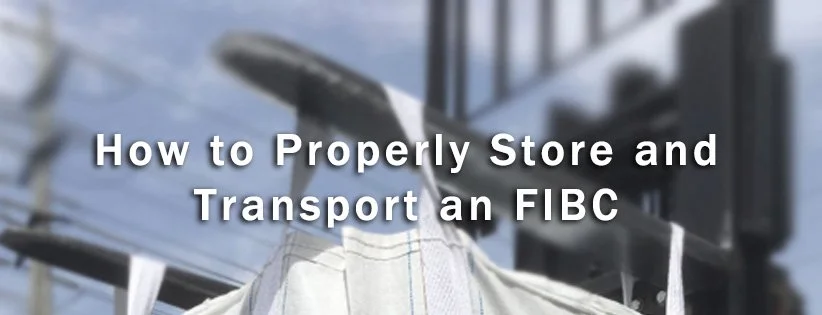How to Properly Store and Transport an FIBC
How to properly store and transport an FIBC bulk bag.
At Capro Industries, we take worker safety very seriously. Our commitment is to demonstrate how to safely handle FIBC or bulk bags. Always adhere to the manufacturers recommendations and any information printed on the label or FIBC. Also observe all applicable regulatory and safety requirements. When storing, only stack FIBCs if they are designed to be stacked, you are sure of their stability, and they are stacked using a “pyramid” or supported stacking method. When pyramid stacking, each bag above the first layer must sit on at least four lower bags. Each layer is subsequently tiered inwards forming a pyramid structure. With supported stacking, bags are stacked against two retaining walls of sufficient strength. Never approach or repair a damaged bag without first removing all bags stacked on top.
Beware of sunlight and UV rays and always protect the bags from the harmful effects of the UV ray’s exposure. Exposure to UV Rays will weaken the strength of the FIBC, as well as exposure to inclement weather. Always try to store your FIBC’s inside a covered facility or warehouse that is free from any water or moisture contamination that could come into contact with your FIBC . Outside storage is not recommended, but if you do, you should always cover them with some type of material that will prevent their exposure to UV rays and inclement weather.
For more safety handling guidelines, visit our website at www.capro.net or contact a packaging expert at 1-800-935-3422.
What is a bulk bag made from?
FIBCs (Flexible Intermediate Bulk Containers) are also known as bulk bags, jumbo bags, tote bags, and super sacks. They are made from a strong, flexible fabric called polypropylene (PP). Polypropylene is a thermoplastic polymer that can be used in many different types of applications. Polypropylene is very durable, and it withstands daily wear and tear. The elasticity and toughness of the fabric defines the materials ability to deform without breaking. The fabric panels that are manufactured of the woven polypropylene are then sewn, sealed, and put together to produce bulk bags. Woven polypropylene is made from polypropylene resin, which is made from petroleum feedstock. Woven polypropylene bulk bags can be used for a wide variety of storage and shipping purposes. For more information contact our experts today at 1-800-935-3422.
“Single Trip” Bulk Bag?
Imagine you receive a 3000 pound bulk bag (Flexible Intermediate Bulk Container) and you have to hoist it up in the air and empty the material inside. As a safety precaution, you look at the bulk bag safe handling label sewn to the bag and you see the statement “SINGLE TRIP ONLY”.
Imagine you receive a 3000 pound bulk bag (Flexible Intermediate Bulk Container) and you have to hoist it up in the air and empty the material inside. As a safety precaution, you look at the bulk bag safe handling label sewn to the bag and you see the statement “SINGLE TRIP ONLY”.
What does that mean?
The bulk bag was already used when it was filled! It was used again when it was shipped! And again, when the bulk bag was offloaded! How safe is it to hoist the bulk bag and empty the material?
This is a common question that is asked all the time.
Let me start by saying that it is perfectly safe to operate and discharge your bag. As a precaution always look to see if there are any visible damage to the bulk bag that may have happened during the previous handling, transportation, and offloading process.
So, what does the term “SINGLE TRIP” mean then? It means that the bulk bag should only be filled and discharged once. The bulk bags can be filled, stored, loaded, off-loaded, lifted as many times as necessary, and discharged at the destination.
What you should not do, is put the bulk bag back in inventory to refill and reuse a second time, unless it is specifically designed to do so.
Our bulk bags are designed to withstand normal handling and jarring up to five times the safe working load during the entire handling process from filling and all the way to emptying. This means that if your bulk bag has a safe working load of 3000 Lbs., it can withstand handling pressure up to 15,000 Lbs.
For more information on bulk bag safety handling, feel free to check out our safety videos at https://www.capro.net/resources
How Safe is your Bulk Bag?
Capro Industries is offering a FREE UV TEST to see if your bulk bag is truly safe to use. Contact us today and get in touch with a packaging expert! 1-800-935-3422
FREE UV TEST ! $1200 VALUE !
How safe is your bulk bag?
Is a safety label enough?
Is losing Thousands of Dollars of Product worth it?
Are you willing to bet your safety and those of others?
Does your bulk bag stand up to the elements?
There is a lot more that goes into the construction of a Bulk Bag (FIBC). One key factor; however, is the quality of the raw material, and the exact formula required to make quality fabric that is durable, pliable, and resistant to the real life exposure to light, temperature and other environmental influences in different climates where FIBCs are being used.
Capro Industries has been dedicated to promoting end-user safety and the correct handling and use of FIBC for twenty years.
Find out if your bulk bag is truly safe to use.
Capro Industries is offering a FREE UV test ($ 1200.00 value) to see if your current FIBC meets the Capro Safety Standards.
Contact our packaging experts today at 1-800-935-3422 and get your complimentary test.





